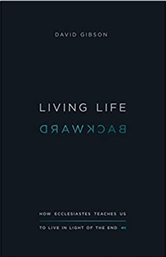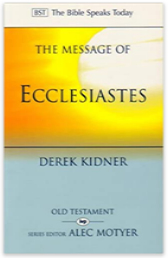Read Ecclesiastes chapter 12:9-14 and Gibson chapter 10.
Ecclesiastes isn't a long book, to be precise it has 5579 words
in the King James Version. A mere fraction of, say, Jeremiah (at 42654 words). And yet...
Maybe that is part of the book's appeal. There's no dense Hebrew poetry to contend with. You don't need to be
well informed on the norms of Old Testament prose. Rather, Qohelet is pithy.
Short and sharp is his preferred route - straight to the heart and the mind, without all that flowery stuff.
And, I'd wager that there are more aphorisms that have made it into colloquial English in this one short book
than in most of its peers.
It's taken us 17 weeks of study to cover those five and a half thousand words. So, what do we take away?
What is it that Qohelet is trying to tell us?
Here are Qohelet's parting words:
Not only was the Teacher wise, but he also imparted knowledge to the people. He pondered
and searched out and set in order many proverbs. The Teacher searched to find just
the right words, and what he wrote was upright and true.
The words of the wise are like goads, their collected sayings like firmly embedded
nails — given by one shepherd. Be warned, my son, of anything in addition to them.
Of making many books there is no end, and much study wearies the body.
Now all has been heard;
here is the conclusion of the matter:
Fear God and keep his commandments,
for this is the duty of all mankind.
For God will bring every deed into judgment,
including every hidden thing,
whether it is good or evil.
-
What is your view now of Ecclesiastes? Has it altered now that we've reached the end?
-
Gibson's leading quote in his last chapter is from Kafka:
"A book must be an axe for the frozen sea inside us."
Is Ecclesiastes such an axe? Do you feel that Qohelet has broken through your internal 'frozen sea'?
-
Gibson (p152) writes "Words change things" and gives the example of a wedding service. "Words of promise spoken in a wedding
ceremony are not describing marriage, or commenting on it; they are creating it. Something exists after their words have been
spoke that did not exist beforehand... It is because of what words do that we have the book of Ecclesiastes".
Do you find the words of Ecclesiastes powerful in a way that, say, the words of Habakkuk aren't?
-
What do you make of Qohelet's "conclusion of the matter" in v13-14? Some see this as a throw away comment;
a shrug of the shoulders, an "oh well, I can't think of anything else so let's go for this" statement - almost
an admission of defeat. Others see
these verses as the culmination of everything that goes before; everything is meaningless apart
from this, and, unlike the analyses everywhere else in the book, Qohelet here makes no attempt to elaborate on these
simple words. What do you think?
-
Would it make any difference to the impact of Ecclesiastes if v9-14 were not there? Some suggest that
these verses were bolted on at a later date to make the book more acceptable. Does it matter?
Some commentators consider that
Ecclesiastes is composed of three distinct voices. The first belongs to Qohelet as the prophet, the "true voice of wisdom"
which speaks in the first person, recounting wisdom through his own experience. The second voice belongs to Qohelet as the
king of Jerusalem, who is more didactic and thus speaks primarily in second-person imperative statements. The third voice
is that of the epilogist, who speaks proverbially in the third person. The epilogist is most identified seen in the book's
first and final verses. Ecclesiastes could then be read as a dialogue between these voices.
-
Do we see a progression throughout the book? Is Qohelet growing and developing his ideas as he writes? If so, how
seriously should we then take his earlier pronouncements?
-
Is an inspired book, a part of the canon of Scripture, allowed to express such a 'progression'? If yes, then
how can we tell which parts of the inspired progression we should take as example and instruction?
-
Following on from earlier VV discussions on 'inspiration' and from the previous question - do we need to work
harder on extracting meaning from Scripture, rather than just taking a text from somewhere (for example Ecclesiastes 4:2-3)
and making that a rule? Where do we draw the line in ignoring a specific command if that command seems to
be counter to the broader theme of a book?
Lastly, as we wind up this discussion, is Qohelet telling us in v12 "Of making many books there is no end, and much study
wearies the body" that we need to stop this discussion after 17 weeks and get on with it?!
Kidner (p106) quotes from CS Lewis's
book 'The Great Divorce' the story of a life long 'searcher' (a member of the VV, perhaps?) who arrives at the Pearly Gates
to be told that his search is now over for "I bring you to the land not of questions but of answers, and you shall see the face of God".
But our searcher wants to keep on searching. "For me there is no such thing as a final answer!" he says, and so he makes his apologies
and hurries off "to his discussion group in hell"!
Discuss!



